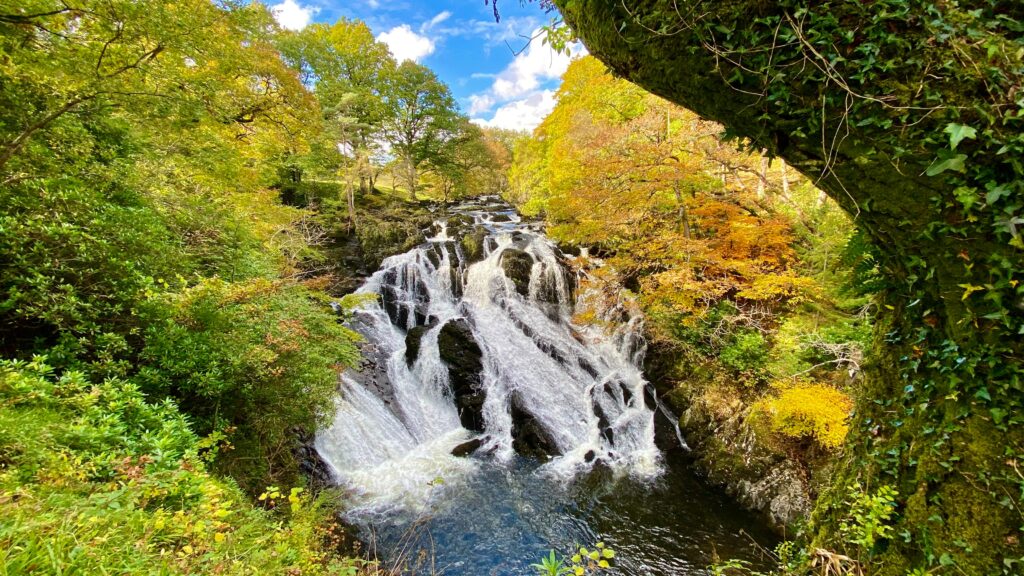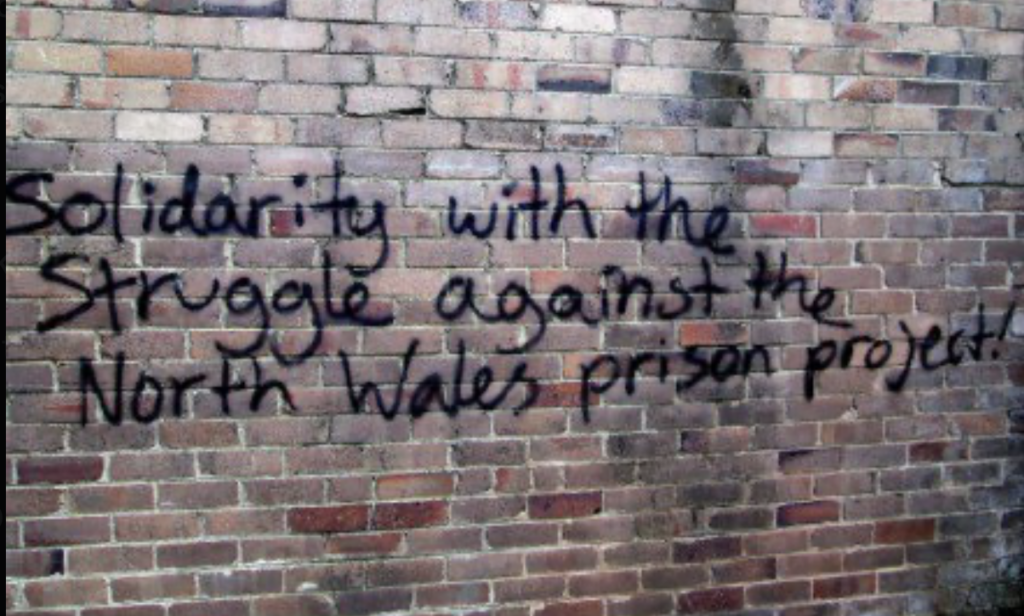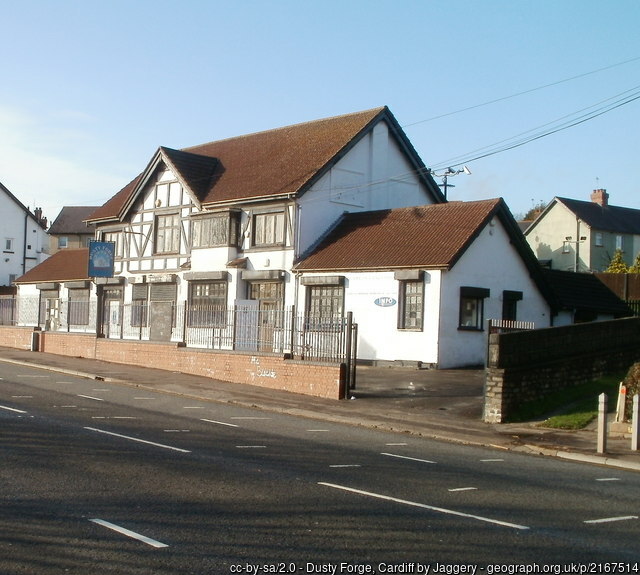Kaja Brown meets some of the people behind the Black Mountains College in Powys and explores the uses of storytelling against climate change
I came to Wales to learn how to tell stories.
In 2017, I attended an Open Day at Aberystwyth University and found myself sitting outside the National Library on a mauve bench under two tall pine trees, contemplating my future. I stared out over the green hills and the glistening blue sea and saw a story unfold in my mind, one about a girl moving to the Welsh countryside to write. In the years that followed, I spent time creating stories in my head while climbing Penglais Hill, or rehearsing poetry out loud while walking in the local forest among the golden gorse and the oak trees.
Storytelling in Wales is ancient. Bards of old Cymru would travel across Britain, revealing stories in return for a roof over their heads. In the 1300s, tales of Celtic myths and Arthurian Legends were collated in the Mabinogion, an important staple of Welsh literature.The stories told were often linked to the land. We had a relationship with nature hardly imaginable nowadays – and it comes through in any historical text you read. In the 1100s a tradition was started at Cardigan Castle called Eisteddfod, a huge celebration of poetry and prose and the Welsh language and culture which still goes on today. And storytelling hasn’t lost its importance over the years. It is everywhere: from the media we consume to the narratives we create for ourselves. Crucially, it can help us to care more greatly about the issues surrounding us.
People only retain 5-10% of information if it consists of statistics alone, whereas when they hear a story they remember 65-70%.
It was in the Aberystwyth Hugh Owen building, sitting and waiting for class to begin, that I first heard the story of Greta Thunberg, the Swedish girl whose individual climate strike caught the attention of the world. This story spurred my own journey into climate activism. I had no idea that my degree would hold this twist; that as a third year Creative Writing student I would find myself setting up an ‘Eco Education Society’. I often felt like an impostor – giving presentations to students of science or politics when I was just a writer.
I have since learned that storytelling is vital to environmentalism. Research shows that people only retain 5-10% of information if it consists of statistics alone, whereas when they hear a story they remember 65-70%.This means that storytelling can be utilised as a way to get vital messages across about the climate crisis. And there are groups pioneering this approach in Cymru.
The Black Mountains College (BMC) is a fairly new Welsh institution based in Talgarth, Powys. Set up in 2018 by authors, creatives and scientists it teaches students in a holistic way about the climate emergency. BMC is a story in itself and one which fascinates me.
Award winning author Ben Rawlence is Chief Executive of BMC. He wanted to set it up ‘as a response to a frustration in the lack of legal action and formal politics in regards to the climate emergency. We need to re-examine the ontology of humans’ relationship to the environment.’
Co-founder Owen Sheers, award-winning poet, playwright and author, explains more about the origins of the college: ‘BMC began with the very initial idea around concepts of rural regeneration. It started with us thinking, well, if we were to found a new institution on this site what would it be? What would the local area need and what would the world need? And by that evening we had come up with a college for the climate crisis that is totally braided and intertwined with the local community. So we wanted to provide green solutions to local problems as well as giving students the education they need for changing the world.’
Innovative. Informed. Independent.
Your support can help us make Wales better.
But why teach the arts as part of a course centred around the climate crisis, which is often seen as a problem for science to solve?
‘Really, the higher education system is designed for the industrial revolution,’ says Sheers. ‘The concept of single subject learning and teaching when we are approaching such complex problems just doesn’t work. We need interdisciplinary teaching. So we thought and talked about how BMC could be radically different, following on from models like American liberal arts colleges. Another important thing to say about BMC is that it isn’t just a Welsh institution because of where it is, but also [because of] its place in the broader environmental ecosystem in Wales, especially when it comes to storytelling. Early on we envisioned BMC as a manifestation of the Wellbeing and Future Generations act. I see that Act as an extraordinary attempt at an act of communal imagination and communal storytelling.’
Climate change is communicating itself. It is the solutions that need our support.
Sheers emphasises that Wales is interesting – and useful – when it comes to the history of storytelling about the climate crisis. ‘In terms of burning and extracting fossil fuels, we were there at the beginning – even though there is a colonial aspect to that and a lot of the revenue streams were going out to England and the mine owners were English… But still, Wales was there at the start, so we have a responsibility to be there at the solution. And if Wales has something to offer it is that we can blueprint exciting and progressive ideas.’
The writer believes that ‘storytelling in environmental action is absolutely vital. For a long time I have seen the climate crisis as the failure narrative of a species. There’s been a failure in telling the story of what is happening and who we are and what we can be. There is also an incredible force of counter narrative. These counter stories are very well funded from oil lobbies and have been extremely powerful in framing our systemic narrative of the status quo and how things are.’
‘We can’t just scream emergency! as that doesn’t work. Climate change is communicating itself. It is the solutions that need our support. People need to be able to hear the story of the changes we need to make. They need to know that they are not all about loss and sacrifice – as there is a lot to gain. There are lots of opportunities, because a lot of things we do now are done badly. This is a chance to take a step back and work out how we can do it better. And the vast majority of solutions will improve most people’s wellbeing, health, [and levels of] equality and justice. So there are two challenges we are looking at here; it’s storytelling about the solutions and storytelling about systemic change.’
Another writer who teaches at Black Mountains College is Tom Bullough. ‘The question we ask at BMC when we teach writing is: Why do you write and what do you write in service of?’ he says. ‘A lot of my books engage with the history of Wales. History has always been used by people to try and affect the future. Like a politician talking about the second world war to rally people.The ‘Dark Ages’ and the Arthurian times [are] in a sense original stories of our culture in Wales, and Britain more widely. We need to try and look at those stories again and find different strands that don’t lead to an extractive or exploitative society, but instead a society that speaks of a deep concern and compassion for all aspects of the living world. These stories are there to be told.’
It is interesting that Bullough draws on stories that are in some senses ‘buried’ deep in the landscape to excavate solutions to the climate crisis. ‘Another interesting thing about the 5th and 6th centuries is the collapse of classical civilisation in Britain and this period of stability disintegrated. Which I hope we won’t face in the future – but nevertheless it goes to show these things are possible, change always happens, and it is crucial that we shape that change instead of burying our heads in the sand and thinking someone else will fix it.’
Dr Natalia Eernstman – ‘artist, educator and researcher, specialising in (community) learning through artful and performative means’ also teaches at Black Mountains College. Her first degree was in environmental science, but she ‘quite quickly realised that if I really did want to change things or protect nature then it is not necessarily about understanding biology and ecology better, it is about people.’ Eernstman says: ‘People are the problem and they need to change’ and that ‘for that to happen we need more artistic approaches to the issue.’
Robust debate and agenda-setting research.
Support Wales’ leading independent think tank.
‘It has been proven over and over again that if you give people more facts, then things won’t change,’ she says. ‘You need to alter the stories that shape their lives. You need to tell the stories that will help shift their behaviours rather than try and convince them by ever more desperate facts about climate change.’
‘If we want to change society then what we need to do first is imagine a different society. Artists do that. They help to imagine new worlds instead of being trapped thinking things will always be the way things are. The arts can expand how we do research and see scientific facts and what we do with them on quite a deep level.’
The only times I ever hear stories of possible changes and solutions are when I’m being sold something – solar panels on my roof, electric cars, organic food.
Eernstman says that a lot of stories we tell about our world simply don’t apply any more. ‘The old stories don’t serve us…but it is difficult to come up with new stories if we are still defined by the old ones. Us seeing ourselves as exploiters of natural resources rather than as being part of ecology, that is a story. How we relate to nature is how we have storified that relationship. It is not an absolute fact. There is nothing in nature or biology that says things can’t be different. It is a cultural story as to how we relate ourselves to the things around us. But this means that these are not fixed things, and they can change really quickly. The idea of writers using world building and coming up with new possibilities, even opening up minds to those new possibilities, is the first step to making it a reality.’
Talking to these writers, thinkers and professors, I was struck by just how groundbreaking this work is, happening here in Wales. The story of BMC is one full of radical and creative ideas to try and drive change. We have received ideas of what the world looks like, but that is a story we can change. In fact our story as a society has always been in constant flux, and we must learn to change again.
A lot of the stories I hear about the climate crisis are quite reductive. They give me the impression that we are trapped in the way things are now. That the story of our current capitalist society is all there is. The only times I ever hear stories of possible changes and solutions are when I’m being sold something – solar panels on my roof, electric cars, organic food. I hardly ever hear the stories about the bigger picture, the stories of system change. But these are the stories that we all need to hear. The stories we all need to tell. As storytellers we must imagine what a better future could look like and then work together with scientists and artists and our community leaders at all levels to make that change happen.
And Wales is a great place to start.
This article was written by Kaja Brown thanks to the Books Council of Wales’ New Audiences Fund.
All articles published on the welsh agenda are subject to IWA’s disclaimer. If you want to support our work tackling Wales’ key challenges, consider becoming a member.





